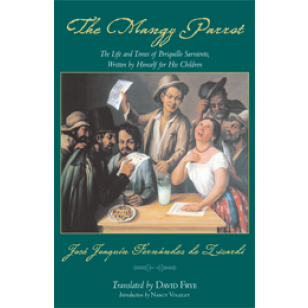The Mangy Parrot
“Finally, an engaging, full-fledged rendition of the first Latin American novel ever—and still one of the savviest. José Joaquin Fernández de Lizardi invented Mexico . . . and David Frye shows us how.”
—Ilan Stavans
eBook edition available for $21.50. Click HERE for more information.
Repeatedly imprisoned for his printed attacks on the Spanish administration, Mexican journalist and publisher José Joaquin Fernández de Lizardi attempted, in 1816, to make an end-run around government censors by disguising his invective as serial fiction. Lizardi’s experiment in subterfuge quickly failed: Spanish officials shut down publication of the novel—the first to be published in Latin America—after the third installment, and within four years Lizardi was back in jail. The whole of The Mangy Parrot (El Periquillo Sarniento) went unpublished until after Lizardi’s death—and a decade after Mexico had won its independence from Spain.
Though never before published in its entirety in English, The Mangy Parrot has become a Mexican classic beloved by generations of Latin American readers. Now, in vibrant American idiom, translator David Frye captures the exuberance of Lizardi’s tale-telling as the author follows his narrator and alter ego, Periquillo Sarniento, through a series of misadventures that exposes the ignorance and corruption plaguing Mexican society on the eve of the wars for independence. Raw descriptions of colonial street life, candid portraits of race and ethnicity, and barely camouflaged attacks on colonial authority fill this comic masterpiece of world literature—the Don Quixote of Latin America.
Reviews:
“Finally, an engaging, full-fledged rendition of the first Latin American novel ever—and still one of the savviest. José Joaquin Fernández de Lizardi invented Mexico . . . and David Frye shows us how.”
—Ilan Stavans
“This new rendering into English . . . is the only complete English translation. Frye performs a delicate balancing act by fashioning language that is fresh and engaging while preserving historical flavor. The result is outstanding. Summing up: Highly recommended.”
—M. S. Arrington, Jr., CHOICE
“With David Frye’s exquisitely clear and elegant translation, the English-speaking world now can fully enjoy El Periquillo Sarniento, the 19th-century novel that rendered the swirling and messy city of Mexico into a comic work of art.”
—Richard Rodriguez, author of Brown: The Last Discovery of America (Viking, 2002)
“El Periquillo Sarniento is a classic of Mexican popular literature, well known to literary scholars as the first Latin American novel. But it has long resisted full translation into English, in part because its earthy, colloquial style and cultural allusions are sometimes difficult to understand and render into readable and vigorous English. It is the language and culture of a particular time and place.
“An accurate, fluent translation that preserves the literal meaning and spirit of the original without becoming obscure and tedious requires a fine way with the English language and considerable knowledge of late colonial Mexico and Mexico City. That is a tall order, and I think David Frye has performed a minor miracle in this translation. The voice of the picaresque protagonist, the juicy stories and ironies, the author’s moral outrage at personal pretense, arrogance, greed, and social injustice come to life in English in ways that are remarkably faithful to the author’s style, pace, and mordant wit. Here in full is Fernández de Lizardi’s Mexico City of the last years of Spanish rule, rich in social types, sights, sounds, smells, and feelings. The translator’s notes are . . . numerous and valuable.”
—William Taylor, Professor of History, University of California at Berkeley
“[This translation] has . . . a vital and compelling energy to it which genuinely and flowingly reflects the tone, fluidity, mood and effects of the original. Its English prose, stylistic sense, linguistic-cultural sensitivity and vocabulary effectively transmit, without any sacrifice in readability, the shrewd combination of vernacular intimacy, chatty loquacity, moralizing solemnity, picaresque cynicism and satiric humor of Lizardi’s original Spanish. The ‘translator’s notes’ and annotations . . . also demonstrate that this translator is. . . well-informed as to the larger cultural and historical context and era which informs this text. This translation fares well to become the authoritative English version of Lizardi’s classic text.”
—Roberto Marquez, Kenan Professor of Latin American and Caribbean Studies, Mt. Holyoke College
“This translation [is] really very good indeed. The tone is right, and Mr. Frye skillfully manages to give it the air of an early 19th-century text whilst keeping it eminently readable and light. He is obviously a gifted translator. . . .
“The Introduction is intelligent and very helpful to an audience who needs to be led into the field, and not too cumbersome to prove heavy.”
—Diana Sorensen, Professor of Romance Languages and Literatures, and of Comparative Literature, Harvard University
About the Authors:
David Frye is Program Associate in Latin American and Caribbean Studies and adjunct professor of Anthropology, University of Michigan. He is the translator of, among other works, Distant Palaces by Abilio Estévez (Arcade, 2004) and the author of Indians Into Mexicans: History and Identity in a Mexican Town (University of Texas, 1996).
Nancy Vogeley is Professor Emerita of Modern Languages, University of San Francisco. She is the author of Lizardi and the Birth of the Novel in Spanish America (University Press of Florida, 2001) and editor of Un manuscrito inédito de poesías de José Joaquín Fernández de Lizardi (Universidad Nacional Autónoma de México and University of California, Berkeley, 2003).





